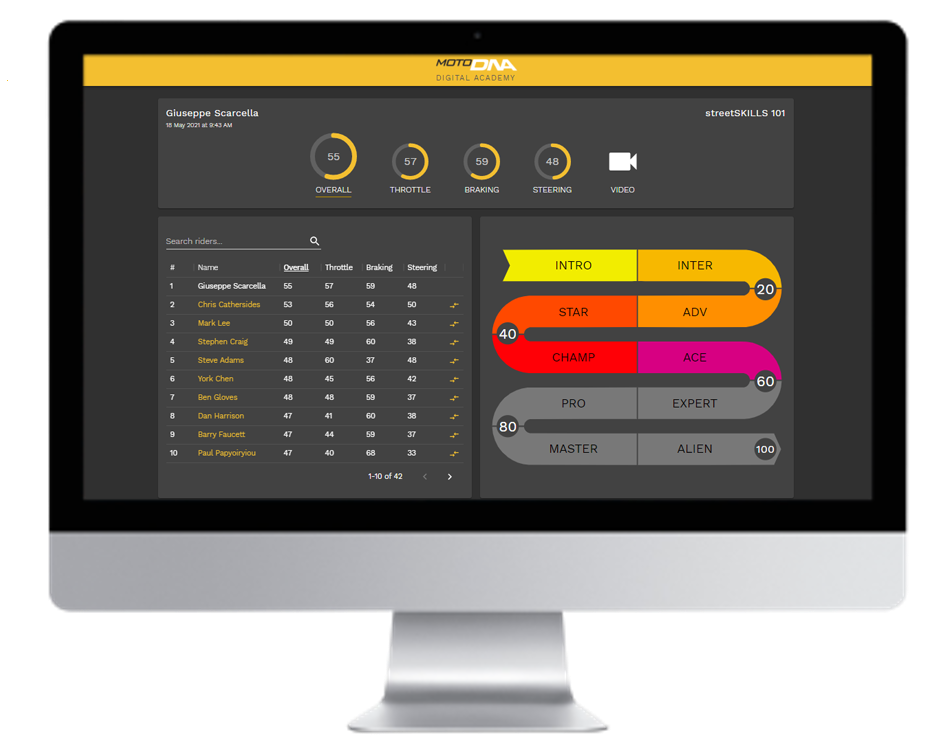Even Legends Need a Coach
Motorcycle coach’s jumped into the spotlight recently after Valentino Rossi acknowledged his new coach, former World Champion Luca Cadalora, as a main contributor to his resurgent form in MotoGP.
Rossi was a notorious poor qualifier and equally not great off the line, spending much of the race trying to catch the front-runners.
After Cadalora came on board, VR46 qualified on pole and achieved his first flag-to-flag race win, at 37 years old.
So why does someone with alien like riding talent, great riding genes, huge work ethic and amazing motivation need a coach?
The nine-time word champion says it’s a mistake to believe you know everything.
The key is to be open to learning new things.
There are many reasons Rossi is the GOAT, but his ability to keep learning and continuously adapt to new threats is surely his greatest trait.
Road And Track
All rider’s can learn from this modesty, whether your goal is fast lap times or to stay safe on the road.
High skill is essential for both road and track riders, with road riders also needing a good understanding of road-craft and a self-preservation attitude.
Learning by your mistakes is fine with most things in life, but making a blunder riding a motorcycle can be expensive and painful, especially on the road, plus hold you back from reaching your potential.
Coaching helps riders reach their goals, often to a level they did not imagine possible.
So, what does a good coach look like?
Is it your mate on Facebook; that’s a bit quicker and more confident than you or the guy parked next to you in the pits?
Avoid following the herd. The first question you should ask is what’s their credibility?
Flow
Part of a coach’s role is to help riders understand the skills they need to achieve their goals and then match these skills to a series of stretch-goals that are challenging, but which are possible to achieve safely; with that riders current skill level.
Increasing the challenge in 5% increments is key to prevent mistakes, inconsistency and crashes.
This is called the flow channel.
(Thanks to Mihaly Csikszentmihalyi)
To achieve flow a person’s body or mind need to be stretched in a voluntary effort to accomplish something difficult and worthwhile.
You don’t necessarily need to be the best rider in the world to experience flow but you do need to overcome challenges to achieve a sense of mastery in your riding.
Illusory Superiority
Does your ambition outweigh your talent?
CS27’s derogatory remark to VR46 after the GOAT took out the talented Aussie during the 2011 Spanish GP in Jerez has more depth that it first appears according to psychologists David Dunning and Justin Kruger.
The Dunning–Kruger effect is a cognitive bias expressed by unskilled individuals suffering from illusory superiority, mistakenly rating their ability much higher than is accurate.
A good coach knows this overconfidence is a common problem amongst many humans including motorcycle riders and has techniques to manage.
Measure and improve
You can expect trouble if you blindly trust your own estimations of your abilities.
It’s useful to think of your riding level on a scale of zero to 100, a new rider would obviously be at the bottom of the scale, say around 5 where as Rossi, Marquez, et al will be at 100.
At motoDNA we use the SkillCard, a handy tool for measuring and tracking your riding progress, taking the guesswork out of your riding.
Key benefits include:
– Understanding your skill level.
– Quickly see which skills to work on next.
– Track the progress of your riding journey.
– Compare to riding benchmarks.
However a good coach also needs a good student. Being honest with your riding level is key.
A great example of honesty is motoDNA student Ash DeBakker.
Ash was a virtual rookie and through hard work and dedication has progressed from a novice street rider through to superbike racing in just one year.
Conclusion
Motorcycle riding is a life long journey and self-reflection is an important part of identifying our weaknesses and converting them into strengths via regular training, practice and attitude adjustments.
About the Author: Mark McVeigh
Data Driven
Developed from thousands of riders at the motoDNA Motorcycle Training, our algorithms measure, grade and train motorcycle riders.
Objective
No more guessing, data sensor fusion combined with our algorithms deeply understand rider behaviour.
Towards Zero
Our urgent and ambitious aim is to empower the motorcycle community to take back control towards zero.


